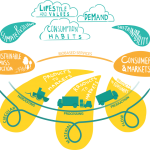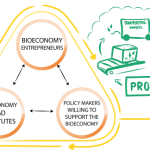RDI2CluB: Biobord innovation hub connecting bioeconomy developers
The goal of the project RDI2CluB project is to support smart, sustainable and inclusive growth of the bioeconomy in rural areas of the Baltic Sea region. RDI2CluB aims to help innovation actors apply EU smart specialisation approaches to their specific field and region. The transnational partnership and network of the project plans to, for instance, support new business development in rural areas and create bio-business hubs to improve innovation management.
At the core is a transnational learning process that results in regional bioeconomy profiles and joint action plans for developing innovation capacity and enhancing smart specialization. Thereafter, the five partner regions build a joint innovation model and a digital platform that functions as a virtual working environment for collaborative development of new products and services. The platform offers an interface to access data on natural resources and bioeconomy potential that can spark new ideas and market entries both at regional and transnational levels.
Biobord is an open virtual innovation hub for connecting bioeconomy developers across the Baltic Sea Region. Biobord offers network members tools for managing the project lifecycle, network building and management, interactive online capacity building, matchmaking and connecting with innovation support services. The hub offers a platform and space for a community of individuals to pursuit innovative activity and entrepreneurship in bioeconomy.
The Biobord Operating Model – Guidelines for Biobord Network and Platform 2.0 provides an updated overview of the network connected by the Biobord platform. Biobord development and piloting is supported by the RDI2CluB.





